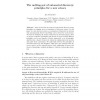29 search results - page 4 / 6 » A Minimum Relative Entropy Principle for Learning and Acting |
ICRA
2007
IEEE
14 years 2 months ago
2007
IEEE
Abstract— Categorizing visual elements is fundamentally important for autonomous mobile robots to get intelligence such as new object acquisition and topological place classific...
WACV
2007
IEEE
14 years 2 months ago
2007
IEEE
Visual categorization is fundamentally important for autonomous mobile robots to get intelligence such as novel object acquisition and topological place recognition. The main dif�...
DIS
1999
Springer
13 years 12 months ago
1999
Springer
After two decades of research on automated discovery, many principles are shaping up as a foundation of discovery science. In this paper we view discovery science as automation of ...
JMLR
2011
13 years 2 months ago
2011
We propose a framework MIC (Multiple Inclusion Criterion) for learning sparse models based on the information theoretic Minimum Description Length (MDL) principle. MIC provides an...
ICML
2007
IEEE
14 years 8 months ago
2007
IEEE
We address feature selection problems for classification of small samples and high dimensionality. A practical example is microarray-based cancer classification problems, where sa...

